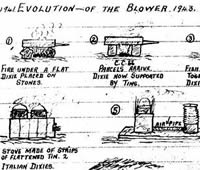Prisoners of War
Camp Cookers
The development of the blower
A Maori POW heats food on his blower
(Click on thumbnails for more detail)
Blowers are an example of the ingenuity of prisoners of war. Made from bits and pieces that the men found in their camps, they were used for heating up food. They went through many modifications, beginning quite simply and developing into marvels of engineering-some even with ball bearings to make the wheel turn more smoothly.
'The efficiency of these gadgets as they evolved, became quite remarkable. Present-day T.V. advertisements claim that the latest electric kettle can boil a cup of water in thirty seconds. Any P.O.W. "blower" worth its salt, fifty years ago, would boil a quart billy in that time or less, fuelled by only handful of charcoal.
"Blower" races became a popular sport in some camps, with front runners usually being heavily backed on the side, in cigarettes. There were usually two divisions on the program: (a) starting up and brewing from ignition (matches were scarce) and (b) the sprint, with billy being put on a fully fired blower. The races were, of course, brief, but quite spirited.'
From article: 'Cooking Behind Barbed Wire: The Evolution of Prison Camp Cookers'
POW memories: Camp cookers, John Parfitt
John Parfitt describes the use of these ingenious devices.
![]() Hear John Parfitt describing 'blowers'. (mp3, 667kb)
Hear John Parfitt describing 'blowers'. (mp3, 667kb)
You've got to have some way of cooking if a Red Cross parcel comes in because, for instance, the tinned meat, you could eat it cold but if you wanted to eat it warm, you've got to warm it. Now that means, there's no fuel in the camp – not at all - so what you do is you turn around and you'd get a block of wood—now that's where the bed boards came in handy because when they make, when they build the bed they put slats across the beds so you get one bed board off someone and you cut that piece out. Now down here you get some canvas or something. It might be some – if you could have part of a tent or something, you'd turn it around and you'd anchor it to the bottom and anchor it to the top and you'd have a bellows. Now that would be the method of putting the wind into and there'd be a pipe to the actual burner, which was going to hold the pot. Now to get that through there you've got to have a – tin tappers as we call them. You had to make the pipes out of Red Cross parcels. If you can imagine a tin of beans at home, and you're going to tap it until it was flat and then roll it up side ways till you'd made the size of a pipe, because from that bellows to there you can't stand over the flame so you've got to have the pipe so they'd make it out of Red Cross tins. The actual container that holds that was also all made out of tin tappers. Then you pumped away with your bellows.
Now you're going to want fuel so every time you walk out for a walking party or anything you'd pull a branch off a tree and you'd put it down your shirt so that when you get back to camp you'll get into the camp with your bit of wood. And if you come to the stage where there is not enough wood on the marches then you take some more bed boards off. And when you think of bed board every bed's got all these lattices – you know when you go to the shop today they sell them – I see them advertised locally and when you think they are only about 2 inch-3 inch bed boards – they cut up very nice. Now, the next thing - we ran out of bed boards so the next thing you do, you put someone up in the ceiling and you can take any of the supporting timber that's holding the roof and you can bring that down into the room as long as the guard's not about…
As I say you've got no saws, no hammers, no chisels, the only thing you've got is tin which they've hammered and to get the tin they got – someone's got a bit of steel from somewhere out on a working party, bought it home and shaped to a hammer – to a flat piece of - use it as a hammer. And when you go into the ceiling it's bolted so you have to turn around and either undo the bolts, or have someone who can tap with something like a knife for long enough to cut the timber – you can break it – and then you bring it down and everybody chips it up.
Now one day, in [camp] 52 it was, the Ities were working and they took a telephone – they were taking the telephone poles down through the camp and they took one telephone down and – a wooden telephone pole – and they dropped it on the ground and went to dinner. When they came back there was no telephone pole and the guards searched the huts and never found it. It had been chopped up. How they did it I wouldn't know yet.
John Partiff interview, 31.01.02, side 4
Next: 'Blower' article >

